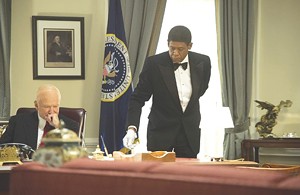Published August 21, 2013 at 11:26 a.m.
Anyone who saw The Paperboy may be tempted to avoid Lee Daniels’ films henceforth. Not only was the Southern gothic potboiler overwrought, but it was stunningly incoherent, especially coming from a director who’d been nominated for an Oscar (for Precious) a few years earlier.
As a storyteller, Daniels has a way of pushing everything over the top. But his willingness not to pull punches gives jolts of energy to The Butler, a film that looks on paper like the tamest Oscar bait ever conceived.
Forest Whitaker plays Cecil Gaines, a fictional figure inspired by a 2008 Washington Post story about a retired White House butler casting his vote for Obama. Like that butler, Gaines serves for 34 years, through the civil rights movement and Vietnam, without once expressing a political opinion to his employers. Dignity and unflappable equanimity are conditions of his job that he fulfills with aplomb. Yet he doesn’t fail to observe that he and his fellow African American employees are paid less than their white counterparts and denied meaningful opportunities for advancement.
The script makes it clear that Gaines’ “perfect servant” façade is a survival strategy for someone raised in a world structured by an unquestioned caste system. After seeing his father slain with impunity by a landowner, the young Gaines takes to heart a mentor’s advice to show a carefully controlled face to white people, and wears the mask to the end of his life. While his wife, Gloria (Oprah Winfrey), isn’t the type to hold her tongue, and his son (David Oyelowo) becomes a Freedom Rider, Gaines seldom raises his voice even at home.
Whitaker infuses this low-key role with nuance, softening his voice to a reassuring purr for his interactions with the heads of state and then showing us how Gaines’ true feelings sneak out from behind his mild-mannered exterior. It’s a magnificent case study in shaping oneself to others’ expectations.
Those heads of state, on the other hand, are only a case study in stunt casting. Robin Williams as Dwight D. Eisenhower? John Cusack as Richard Nixon? Both segments feel like rejected “Saturday Night Live” sketches, while Alan Rickman and Jane Fonda as Ronald and Nancy Reagan don’t fare much better. The script by Danny Strong (Game Change) hits all the standard beats, reaffirming our clichés about the midcentury White House with gusto.
When the movie focuses on the free-wheeling, irreverent banter among the butlers, or takes us home with Gaines, it gets more interesting. The scenes of Cecil and Gloria shooting the breeze with their neighbors — including Terrence Howard as a charming ne’er-do-well — have a loose, improvisational quality that energizes the film in small doses. (Too much of that unscripted feeling sank The Paperboy.)
Oyelowo’s civil-rights subplot initially seems promising, too. Daniels’ depiction of the lunch-counter sit-ins is as visceral as anything in Django Unchained, bound to make an impression on young moviegoers ignorant of the history of segregation. After that, however, this story collapses into its own clichés, with the Black Panther movement, for instance, depicted more as a fashion statement than an ideology.
As time speeds up, Daniels gets laughs by presenting decades through their popular icons — “Soul Train” gear for the ’70s, ugly jogging suits for the ’80s. Subtlety flies out the window, and sentimentality comes in to stay. By the end, The Butler is exactly what you’d expect from a self-consciously “important” film.
That said, some of the “importance” is earned, because The Butler raises questions about how white and black people censor themselves when they interact — yes, even today. Gaines is a hero audiences can and will embrace, but the movie forces us to ask why. Is it because he’s a hardworking man of principle, or because he’s so good at unfurling a white tablecloth over ugly realities?
More By This Author
Comments
Comments are closed.
From 2014-2020, Seven Days allowed readers to comment on all stories posted on our website. While we've appreciated the suggestions and insights, right now Seven Days is prioritizing our core mission — producing high-quality, responsible local journalism — over moderating online debates between readers.
To criticize, correct or praise our reporting, please send us a letter to the editor or send us a tip. We’ll check it out and report the results.
Online comments may return when we have better tech tools for managing them. Thanks for reading.












































